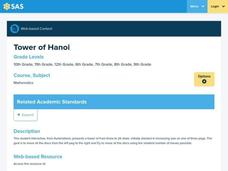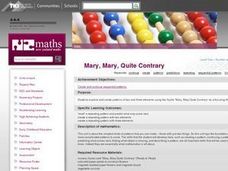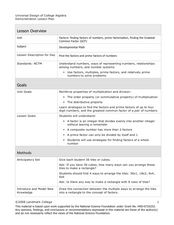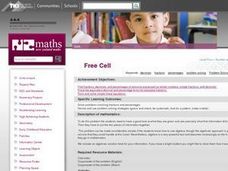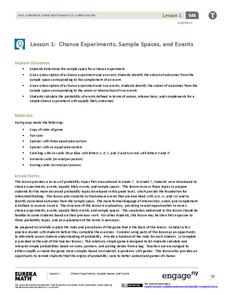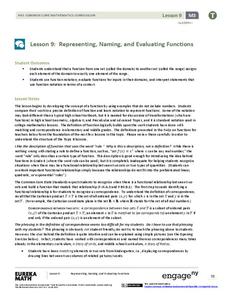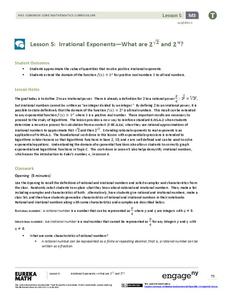Curated OER
Algebra II: Crickets-Nature's Thermometer
Students translate functional relationships into equations to answer questions. Students answer questions using different representations of the relationships: function rules, graphs of the function, tables of values, and equations and...
Curated OER
Algebra I: A Draining Swimming Pool
Learners analyze and develop symbolic representations to describe the amount of water left in a pool being pumped out after a given amount of time, with various pumping rates and initial quantities of water in the pool.
Curated OER
Equations, Expressions, Factorization
Students graph and solve equations and expressions. In this algebra activity, students use simple factorization to simplify expressions. They review for an exam by doing basic algebra.
Curated OER
Similar Right Triangles-Introductions to Trigonometry
In this geometry worksheet, students examine similar right triangles as the basis for the foundation of trigonometry. Students define the basic trigonometric functions and use a calculator to find the trigonometric value of an angle. The...
Curated OER
Maximum Volume of a cuboid and open-topped box
In this Algebra II/Pre-Calculus worksheet, students investigate the maximum volume of a cuboid and the maximum volume of an open-topped box. Additionally, students determine the acceptable size for boxes to meet parcel service...
Curated OER
Time Trials
Learners investigate speed, time and distance. In this algebra lesson, students utilize their knowledge of linear equations to solve problems related to time, speed and distance. This assignment is hands on using two toy race cars.
Curated OER
What's My Rule? Simple Linear Functions
Young scholars investigate simple linear functions by trying to guess a function rule from inputs and outputs. They write the function rule in algebraic form.
Curated OER
Graph Creator
Students rewrite equations using algebraic symbols. In this algebra lesson plan, students graph linear equations using the slope and y intercept. They make predictions about their graphs and analyze the results.
Curated OER
Tower of Hanoi
Students create a plan to solve word problems. In this algebra activity, students identify important steps to take when setting up a word problem. They relate algebra to the real world.
Alabama Learning Exchange
"Like Terms", I Add Them
Ninth graders add and subtract polynomials. In this Algebra I lesson plan, 9th graders work practice problems as they view a PowerPoint presentation of the lesson plan. Both the horizontal and vertical methods of addition and...
Curated OER
Robot Sketcher
Students analyze and solve word problems. In this algebra lesson, students explore their reasoning skills as they analyze a problems and come up with the correct steps to solve it. They create a plan and execute it correctly.
Curated OER
Two Terrains
Students compare two cell phone providers and relate those concepts to motion. For this algebra lesson, students identify the unknown in a problem using variables. They calculate the velocity, motion and displacement of different objects.
Curated OER
Canada Data Map
Students collect data and analyze it. In this algebra lesson, students collect data on the population characteristic in different regions. They use population, culture, settlement and others to help in their criteria.
Curated OER
Time Travel, Black Holes, and Relativity
Students read the novel, The Time Machine, and compare H.G. Well's perceptions of the future with those presented in The Third Wave, by Alvin Toffler. They research current scientific and mathematical theories that relate to space and time.
Curated OER
Mary, Mary, Quite Contrary
First graders use simple vegetable cut out and colored paper flower peddles to make simple patterns. They start out with a simple 2-element patterns around the theme of a daisy and increase in difficulty.
Curated OER
Find the Factors and Prime Factors
Show the class how to find the factors of numbers. They use a variety of strategies, including unifix cubes, to find the factors of a whole number. This resource includes clear procedure to follow. Included are an anticipatory set,...
Curated OER
Free Cell
Fourth graders use algebra to begin solving a problem. The problem has a real world application to engage learners. The main skill is converting fractions and decimals. Also finding the right number sentence for the word problem is...
EngageNY
Rational and Irrational Numbers
Back to the basics: learning how to add numbers. The 17th installment of a 35-part module first reviews addition techniques for rational numbers, such as graphical methods (number line) and numerical methods (standard algorithm). It goes...
EngageNY
Chance Experiments, Sample Spaces, and Events
Want a leg up on the competition? Show classes how to use mathematics to their advantage when playing games. Learners calculate probabilities to determine a reasonable scoring strategy for a game.
EngageNY
Representing, Naming, and Evaluating Functions (Part 1)
Begin the discussion of domain and range using something familiar. Before introducing numbers, the lesson uses words to explore the idea of input and outputs and addresses the concept of a function along with domain and range.
EngageNY
Irrational Exponents—What are 2^√2 and 2^π?
Extend the concept of exponents to irrational numbers. In the fifth installment of a 35-part module, individuals use calculators and rational exponents to estimate the values of 2^(sqrt(2)) and 2^(pi). The final goal is to show that the...
EngageNY
Building Logarithmic Tables
Thank goodness we have calculators to compute logarithms. Pupils use calculators to create logarithmic tables to estimate values and use these tables to discover patterns (properties). The second half of the instructional activity has...
CK-12 Foundation
Finding and Defining Parts of a Polynomial Function Graph
So many things to remember when graphing polynomials and this guide gives a helping hand to do so. The packet goes through examples and explains things like critical values, end behavior, and multiplicities. There are image links and...
Curated OER
Probability and Applications of Simulations
Middle schoolers apply properties of probability to the real world. In this probability lesson, learners simulate the construction of empirical distribution. They collect and analyze data using central tendencies.








